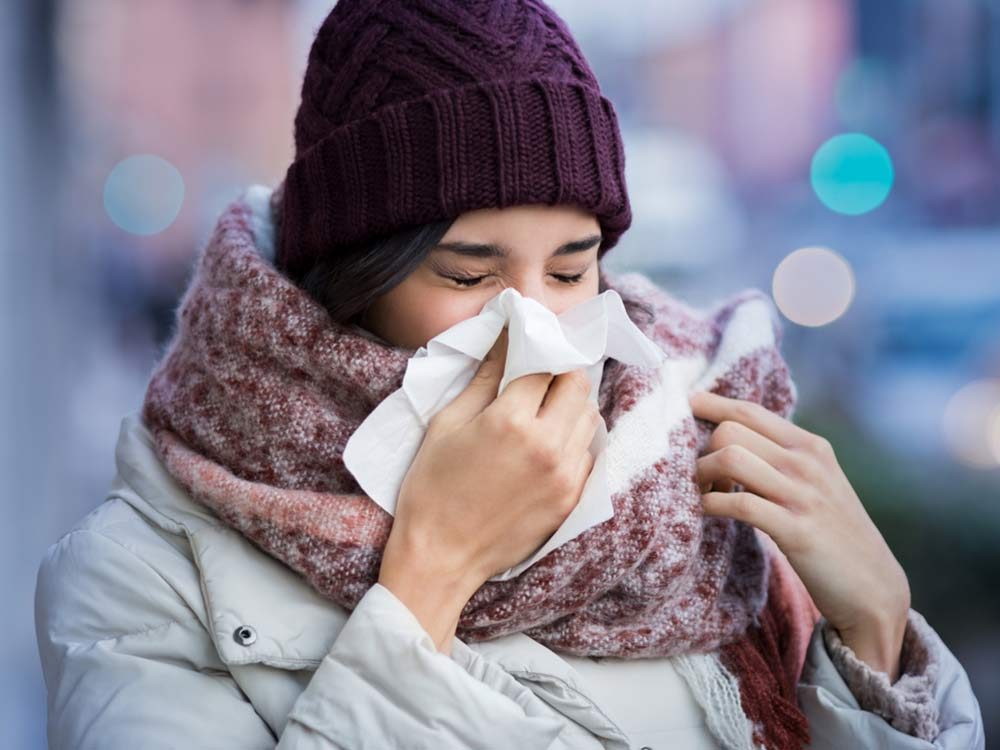
Signs of Stress People Tend to Ignore
Unusual weight changes
“Stress triggers the release of the hormone cortisol, which changes the way you metabolize fat, protein and carbs, leading to weight gain or loss,” says Dr. Shanna Levine, a primary care physician and clinical instructor of medicine at Mount Sinai’s Icahn School of Medicine in New York. Stress can also cause you to overeat or undereat.
What to do: Snack on nuts. The protein will help if you’re undereating, and the fibre will fill you up if you’ve been bingeing. (Find out the best foods to boost your mood.)

A fuzzy brain
One of the most common signs of stress is “brain fog.” Too much cortisol can make it harder to concentrate and cause memory problems, anxiety and depression, says Levine.
What to do: Try to relax until you regain your focus. Practice closing your eyes and concentrate only on your breath.
Here’s what might happen when you start meditating every day.

Hives
When your body experiences stress, it releases a chemical called histamine and then—boom—hives galore. Also, if your immune system is weakened by worries, your skin can become irritated as a result of new sensitivities to things such as heat, lotions or detergent.
What to do: Place a cool, damp towel on the affected area. If that doesn’t work, take an antihistamine.
Here are more skin changes you should never ignore.

Headaches
It’s common for your muscles to tense up when you’re under pressure, which can cause a pounding head. Prone to migraines? Stress can trigger them or make them worse.
What to do: If you don’t want to take ibuprofen, try inhaling lavender essential oil or dabbing peppermint oil—diluted in a carrier oil—on your temples when the pain starts.
Discover more home remedies that are backed by science.

Sour stomach
Stress can cause the body to produce more digestive acid, resulting in heartburn. “It can also slow the emptying of food from the stomach, which causes gas and bloating and may even increase the number of times your colon contracts, leading to cramping and diarrhea,” says Dr. Deborah Rhodes, a Mayo Clinic internal medicine physician.
What to do: Take an over-the-counter antacid or drink ginger tea.
Here’s more expert advice on how to avoid heartburn.

Hair falling out
Stress may push your hair follicles into a resting phase, causing the hair to fall out a few months later. It can also cause the body’s immune system to attack your follicles.
What to do: Be patient. Once your stress level returns to normal, your hair should start growing back.
Find out more sneaky reasons your hair is falling out.

Acne
Cortisol is the culprit here, too—it causes skin glands to make more oil. Along with dirt and dead skin cells, the oil can get trapped inside hair follicles, producing pimples.
What to do: Topical creams containing benzoyl peroxide, which has antibacterial properties, or salicylic acid, which can keep pores from clogging, may clear up acne if applied regularly.
Check out the best foods for healthy, glowing skin.

Perpetual cold
When stress suppresses the immune system, it’s harder to fight off bugs. Researchers at Carnegie Mellon University infected volunteers with a cold virus; those who reported in a survey that they were dealing with many stresses were twice as likely to get sick as those with fewer problems.
What to do: One study found that zinc supplements or lozenges can shorten the length of a cold by about a day if taken within 24 hours of feeling sick. Regular exercise—although nothing too strenuous if you’re still feeling ill—and plenty of sleep can also give your immune system a boost.
Now that you know how to recognize the signs of stress, check out 10 mental health podcasts worth adding to your playlist.